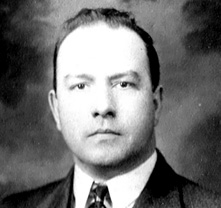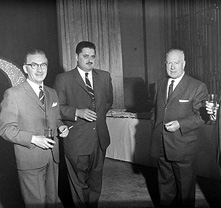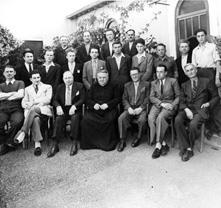J.A. DeSève (1896-1968)
-

Photographic portrait of Joseph-Alexandre DeSève.
Source : Collection Yves Lever
-

J.A. DeSève accompanied by Paul L’Anglais (left). Between them, Roland Giguère.
Source : Cinémathèque québécoise, 1998.2157.PH.6285
-

The staff of Fiat Film. In the centre of the first row, J.A. DeSève and Abbé Aloysius Vachet. J.A. DeSève.
Source : Cinémathèque québécoise, 2001.1001.PH
The Business Mogul
J.A. DeSève was born into a middle-class family in St. Henri, a working-class district of Montreal. His accountant father, however, died when he was eleven years old, leaving a widow and eleven children. He had to quit school at the age of thirteen and take on small jobs such as delivery boy, newspaper vendor on trains, etc.
Hard-working and very curious boy, he had a knack for making his way. At sixteen he became a bank clerk and learned the nuts and bolts of the financial system, taking business administration courses by correspondence at the same time. By his early twenties, he had become a notary’s clerk and had mastered the world of business. Despite various setbacks caused by the economic crisis of 1929, he succeeded in forming companies which enabled him to set out on a career as a businessman.
At the Head of France-Film
In 1929 he saw that talking cinema was going to create an opening for French-Canadian entrepreneurs to provide what Hollywood couldn’t: films in French. Occupied with other matters, in 1930 he participated at a distance in the founding of the company France-Film. In early 1933, DeSève took over the Théâtre St-Denis from Jos Cardinal and gained control of Édouard Garand’s distribution company, which he re-named Franco-Canada Films. He manoeuvred so well that in September 1934 he was able to merge his company with France-Film and take over as executive director, becoming the almost exclusive distributor of French film in Quebec. After a brief period when he was shut out of France-Film, from 1945 to 1948, he became the company’s owner.
On the Road to Vertical Integration
Right from the start of his career in the film industry, DeSève dreamt of what we today call “vertical integration”. Like the major U.S. studios, he began to extend his firm vertically. After starting out in film exhibition and distribution, in the 1940s he began to work in film production. France-Film distributed and exhibited in its movie theatres films produced by a variety of companies which DeSève controlled or financed: Renaissance Films (Le gros Bill, Les lumières de ma ville), Alliance cinématographique canadienne (La petite Aurore l’enfant martyre) and Les productions Gratien Gélinas (Tit-Coq). In addition, France-Film distributed the films of Paul L’Anglais’ company Québec Productions, making DeSève the exclusive distributor of French-Canadian films in the early 1950s. J.A. DeSève made a fortune from the success of these films across Quebec.
And to Finish Off: Television
In 1947, foreseeing the arrival of television, DeSève had France-Film purchase the television rights to French cinema. He thus became the almost exclusive supplier of films to Radio-Canada from the moment it went on the air. DeSève also founded various television production companies. Business was great, and in 1961 he used his accumulated fortune to found Télé-Métropole (today known as TVA), which turned a profit from its first year of operations.
Upon DeSève’s death, most of his fortune was employed in the founding of the Fondation J.A. DeSève. The street where TVA is located was named after him in 1969.